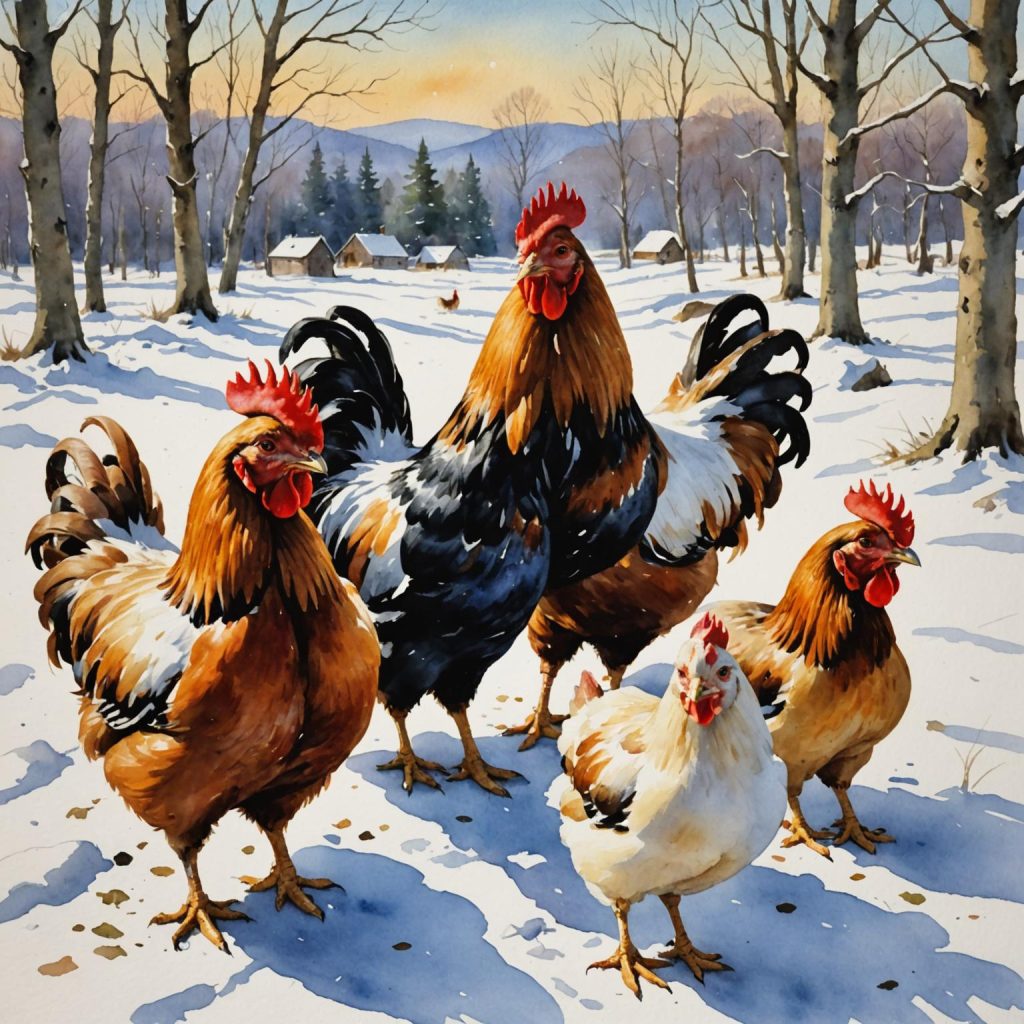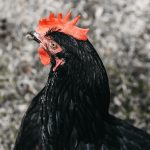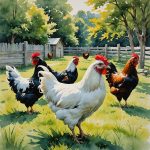Cold weather can have a significant impact on chickens, affecting their health, behavior, and overall well-being. When temperatures drop, chickens can experience stress, decreased egg production, and even frostbite if not properly cared for. It’s important for chicken owners to understand the potential impact of cold weather on their flock in order to take the necessary steps to keep them warm and healthy during the winter months.
Chickens are naturally equipped to handle cold weather to some extent, as they have feathers to provide insulation and can fluff up their feathers to trap warm air close to their bodies. However, extreme cold temperatures can still pose a threat to their health. Chickens are susceptible to frostbite on their combs, wattles, and feet, which can lead to tissue damage and infection if not addressed promptly. Additionally, cold weather can cause chickens to burn more energy to stay warm, leading to decreased egg production and potential weight loss. Understanding these potential impacts of cold weather on chickens is crucial for providing the necessary care and attention to ensure their well-being during the winter months.
Table of Contents
- 1 Providing Adequate Shelter and Insulation for Your Flock
- 2 Implementing Heating Options for the Coop
- 3 Ensuring Proper Ventilation to Prevent Moisture Buildup
- 4 Adjusting Feeding and Watering Practices for Winter
- 5 Monitoring the Health and Behavior of Your Chickens
- 6 Additional Tips for Keeping Chickens Warm and Happy in the Winter
Providing Adequate Shelter and Insulation for Your Flock
One of the most important steps in keeping chickens warm during the winter is providing them with adequate shelter and insulation. A well-constructed coop with proper insulation can help protect chickens from the cold and keep them comfortable throughout the winter months. When designing or selecting a coop for your flock, it’s important to consider factors such as ventilation, draft prevention, and adequate space for the number of chickens in your flock.
Insulating the coop can help retain heat and keep the interior temperature more stable, reducing the impact of cold weather on the chickens. This can be achieved by adding insulation material to the walls, ceiling, and floor of the coop. Additionally, providing a thick layer of bedding such as straw or wood shavings can help insulate the floor and provide a comfortable surface for the chickens to rest on. Ensuring that the coop is well-sealed to prevent drafts is also crucial for maintaining a warm and comfortable environment for the chickens. By providing adequate shelter and insulation, chicken owners can help protect their flock from the negative effects of cold weather.
Implementing Heating Options for the Coop
In some cases, providing additional heat inside the coop may be necessary to keep chickens warm during extremely cold weather. There are several heating options available for chicken coops, including heat lamps, radiant heaters, and heated pads. When considering heating options for the coop, it’s important to prioritize safety and choose a heating source that is suitable for use around chickens.
Heat lamps are a popular choice for providing supplemental heat in chicken coops, as they can help raise the temperature inside the coop and prevent frostbite in extreme cold conditions. However, it’s important to use caution when using heat lamps, as they can pose a fire hazard if not properly secured and monitored. Radiant heaters are another option for providing heat in the coop, as they emit infrared heat that warms objects rather than the air, making them an efficient choice for keeping chickens warm. Heated pads or mats placed on the floor of the coop can also provide a warm surface for chickens to rest on during cold weather. When implementing heating options for the coop, it’s important to carefully follow safety guidelines and monitor the temperature inside the coop to ensure that it remains at a comfortable level for the chickens.
Ensuring Proper Ventilation to Prevent Moisture Buildup
While it’s important to keep chickens warm during the winter, it’s equally important to ensure proper ventilation in the coop to prevent moisture buildup. Poor ventilation can lead to high humidity levels inside the coop, which can create a damp environment that is conducive to mold growth and respiratory issues in chickens. Proper ventilation is essential for maintaining good air quality and preventing moisture buildup in the coop.
To ensure proper ventilation in the coop, it’s important to provide adequate airflow without creating drafts that can make the chickens uncomfortable. This can be achieved by installing vents or windows that can be opened and closed as needed to regulate airflow. Additionally, ensuring that the coop is well-sealed against drafts can help maintain a comfortable environment for the chickens while still allowing for proper ventilation. By balancing warmth and ventilation, chicken owners can create a healthy and comfortable living environment for their flock during the winter months.
Adjusting Feeding and Watering Practices for Winter
In addition to providing adequate shelter and warmth, adjusting feeding and watering practices is important for keeping chickens healthy during the winter. Cold weather can impact a chicken’s metabolism and energy needs, so it’s important to provide them with a balanced diet and access to fresh water to support their health during the winter months.
During cold weather, chickens may require additional energy to stay warm, so it’s important to adjust their diet accordingly. Providing a high-quality layer feed with added protein can help support egg production and maintain body condition during the winter months. Additionally, offering supplemental treats such as scratch grains or mealworms can provide extra energy for chickens during cold weather. It’s also important to ensure that chickens have access to fresh water at all times, as dehydration can be a concern during winter when water sources may freeze. Using heated waterers or regularly checking and replacing frozen water containers can help ensure that chickens have access to water throughout the winter.
Monitoring the Health and Behavior of Your Chickens
During the winter months, it’s important for chicken owners to closely monitor the health and behavior of their flock to ensure that they are adapting well to the cold weather. Cold temperatures can put stress on chickens and make them more susceptible to illness, so it’s important to be vigilant in observing any changes in their behavior or appearance.
Monitoring your chickens’ behavior can provide valuable insight into their well-being during the winter. Signs of distress or discomfort such as huddling together for warmth, decreased activity, or changes in eating and drinking habits may indicate that they are struggling with the cold weather. Additionally, regularly checking your chickens for signs of frostbite on their combs, wattles, and feet can help prevent serious health issues from developing. By staying attentive to your flock’s behavior and appearance, you can quickly address any concerns and take proactive measures to keep them healthy and comfortable during the winter months.
Additional Tips for Keeping Chickens Warm and Happy in the Winter
In addition to providing shelter, warmth, and proper care for your flock during the winter, there are several additional tips that can help keep chickens warm and happy during cold weather. One important consideration is providing ample space inside the coop for your chickens to move around comfortably without feeling crowded. Overcrowding can lead to increased stress and competition for resources among your flock, so ensuring that they have enough space is crucial for their well-being.
Another tip for keeping chickens warm in winter is providing them with opportunities for exercise and mental stimulation. Even in cold weather, it’s important for chickens to have access to outdoor areas where they can scratch, peck, and explore. Allowing your flock time outside of the coop each day can help keep them active and engaged, which is important for their overall well-being during the winter months.
Finally, it’s important to be proactive in preparing your flock for winter before temperatures drop. This may include stocking up on feed and bedding supplies, checking heating equipment for proper function, and making any necessary repairs or improvements to the coop before cold weather sets in. By taking these proactive measures, you can help ensure that your flock stays warm, healthy, and happy throughout the winter season.
In conclusion, understanding the impact of cold weather on chickens is essential for providing them with the care they need to stay warm and healthy during the winter months. By providing adequate shelter and insulation, implementing heating options when necessary, ensuring proper ventilation, adjusting feeding and watering practices, monitoring their health and behavior, and following additional tips for keeping them warm and happy in winter, chicken owners can help their flock thrive even in cold weather conditions. With careful attention and proactive care, chickens can stay comfortable and content throughout the winter season.
Meet Walter, the feathered-friend fanatic of Florida! Nestled in the sunshine state, Walter struts through life with his feathered companions, clucking his way to happiness. With a coop that’s fancier than a five-star hotel, he’s the Don Juan of the chicken world. When he’s not teaching his hens to do the cha-cha, you’ll find him in a heated debate with his prized rooster, Sir Clucks-a-Lot. Walter’s poultry passion is no yolk; he’s the sunny-side-up guy you never knew you needed in your flock of friends!







